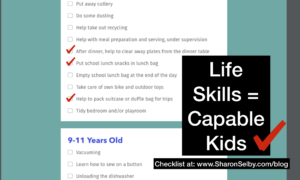
As one of the greatest parenting educators and child psychologists, Dr. Hain Ginnott said:
“Treat a child as though they are already the person they are capable of becoming.”
Developing a sense of CAPABILITY in our children, is one of the foundational principles in Adlerian parenting. (Alfred Adler 1870-1937, was one of the founding fathers of psychology, psychiatrist and a pioneer in parent education.)
His parenting theory was well ahead of his time, as back in his day, he was not recommending that children be seen and not heard nor that children be physically punished.
He recognized the importance of significance. Every individual needs to feel significant.
Helping or Hindering Life Skills?
Parenting has changed A LOT from previous generations. We place great value on connecting with our children and being very attuned to their every need. This is really important, but sometimes we can be so caring or so willing to help that we do too much for our children.
We’ve all heard the stories of parents who’ve called their child’s university professor to complain about their child’s letter grade! Although, this is not a common scenario, there are lots of mini daily interactions where we might be unconsciously undermining our child’s sense of capability, and not giving them enough responsibility.
Are we helping or hindering their development of life skills?
Examples of Age Appropriate Life Skills (and link for checklist)
Does your four year old help set the table? Does he/she find a special rock, shell or leaf and create a centre piece for the dining room table?
Does your seven year old help to clear the table?
Does your ten year old know how to sew on a button or operate the washing machine?
Does your twelve year old know how to take the bus?
Does your fifteen year old know how to complete job application forms or book recreational activities?
Today I have a special gift for you. I’ve created a pdf checklist with suggested appropriate life skills for your 2-18 year old to give you a quick overview of the tasks that we can be working toward with our kids – after all this is a journey!
You can view the checklist HERE and feel free to download it too (and share with your friends). **To download, you’ll see a tiny print icon in the top right hand corner when you view the cover page of the guide, and this will take you to the pdf version, which will let you print from there.
RESPONSIBLE = RESPONSE-ABLE
I love the concept of thinking of our children being responsible which means response-able.
While our children are still living under our roof, we want to be sure that they are prepared and able to respond to life in the “real world” once they leave home.
“What we instil in our children will be the foundation upon which they build their future.”
~ Steve Maraboli
Warmly,

PS. If you found this article helpful, please share with your friends and family in order that this checklist of appropriate age life skills can be utilized by many families.
PPS. Registration is now open for my next round of in-person and online Brain Science Groups where I teach children ages 7-9 yrs. and 10-12yrs. how to understand anxiety and anxiety management strategies. For more information and to register online, please click here.
**To purchase my children’s book (parent and clinician’s resource), Surfing the Worry Imp’s Wave ~ Empowering Children to Understand and Overpower Anxiety, click here. I truly believe we can lower the high rates of child anxiety, if we are proactive and teach children about their brain, their negative voice/worries from an early age. My book is for children ages 5-10 yrs. By learning the ten skills in my book, we are helping children develop their sense of capability and increasing their sense of resilience.
To view my previous articles on chores and responsibilities, click on the links below:
How Do I Get My Child to Be More Responsible?
The Best Tip for Getting Your Child to Do Chores
Allowance and How to Raise Money Smart Kids
Want to Connect?
Subscribe now to receive free weekly parenting tips and inspiration.






